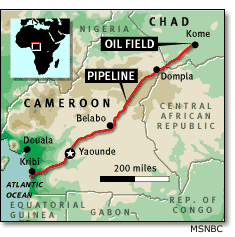|
 |
||||
|
|
THE
PROJECT
The Chad Oil and Pipeline Project is a $3.7 billion development project comprising some 300 oil wells, which are expected to extract approximately one billion barrels of oil over twenty-five years. Located in Chad's southwestern region, it is one of Africa's largest public/private development projects. Once extracted, the oil will be transported by a 640 mile underground pipeline, through neighboring Cameroon, to an offshore export loading facility. Construction began in October 2000 and the oil is expected to flow in 2004. Project ownership is comprised of a three-company oil consortium (Exxon/Mobil 40%, Petronas Malaysia 35% and Chevron 25%) and the governments of Chad and Cameroon, which hold a combined 3% stake in the pipeline portion of the project. The funds used to secure the investment share of the two countries were provided in the form of a loan by the World Bank. Exxon/Mobil, operating under the name EssoChad, is the project's construction and operations manager.
Chad is a landlocked country in north-central Africa. It is among the world's poorest countries, a condition aggravated by various civil wars during thirty of its forty years of independence from France. Political stability has been hindered by tensions between the Muslim populations in the north and non-Muslim populations in the south, as well as by conflicts within each population. The political conflicts, coupled with its limited natural resources, have resulted in minimal private investment. The country is governed by an elected President, Idris Deby, a Muslim from the north who seized power in 1990 and was elected for a five-year term in June 2001. The current Constitution was passed by referendum in 1995 and a constitutional court began to hear cases in 2000. Chad's legal system is based on customary law, French civil law and now the provisions of the new Constitution. It has not accept compulsory International Court of Justice (ICJ) jurisdiction. 125 four year seats are available in the country's single-house legislature, which will held elections in late 2001. As one of the ten poorest countries in the world, Chad's economic development is challenged by its landlocked geography and the desert climate in the northern half of the state. In 2000, GDP was estimated at $8.1 billion with an expected real growth rate of 4% and an inflation rate of 3%. Per capita GDP was $1000. Most of the population (85%) worked in agriculture, often on the subsistence level. According to a 1995 estimate 64% of the population lives below the poverty line, receiving inadequate health care and educational opportunities. Economic factors undoubtedly contribute to the fact that Chad has 1:30,000 doctor to patient ratio and an adult illiteracy rate of 80% (people over the age of fifteen illiterate in French or Arabic). Life expectancy is approximately 50 years (48.86 years for males and 52.98 years for females) and the infant mortality rate is 95.06 deaths/1,000 live births (2001 est.). Chad is said to be one of the few countries in the world never to have a railroad, and with less than 200 miles of paved roads in one of Africa's largest countries, its road infrastructure is poor. The communications system is also underdeveloped. A 1997 estimate by the CIA claims Chad has only 7000 main phone lines in use. Internet access is even worse: 1 server used by an estimated 1000 people out of a population of 8,707,078 (2000 estimate). The UNDP Human Development Report for 2000, ranks Chad eighth from the bottom of the 174 countries surveyed. SOCIAL CONDITIONS IN CHAD PRIOR TO THE OIL PROJECT Since receiving independence from France in 1960, nation-building in Chad has been hindered by civil wars largely stemming from competition among ethnically-defined groups seeking overall political power. There has also been external interference from Libya in the north. Traditionally in Chad political power holders governed local resources such as grazing rights, water, and land for agricultural cultivation.
Today the group in control of the country administers all the nation's natural resources and designs and implements all social, economic and political policies, including the use of external aid. Competition for this power has undermined other efforts to unite disparate tribal cultures under a single state authority based on pluralism, rule of law, and a just distribution of resources, power and authority based on constitutional democracy. These political ideals have remained on the horizon as each successive president sought to centralize power in his office. Recent changes in communications and growth in the numbers of local NGOs have brought world attention to the country and to the oil project in particular. In June 2000, the World Bank's Board of Directors gave the final approval for its loan to the Chadian and Cameroonian governments. This was the final component necessary to move the project forward. Many environmental and human rights international NGOs and activists opposed the Bank's approval. Their reasons included Chad's poor human rights record and environmentalists' concerns that proper legal and technical environmental safeguards did not exist in Chad, thus exonerating the oil consortium from any future liability or accountability with respect to its operations. Several international NGOs requested the World Bank to grant a two-year moratorium to its approval of the project. The Bank declined, http://www.globalpolicy.org/ngos/wbank/chad.htm As a precondition to the two governments' loan request, the World
Bank required the oil consortium to prepare a comprehensive environmental
assessment (EA) and risk management plans. This resulted in a 13-volume
package, six volumes of which were dedicated to issues in Chad.
(While the primary focus of this assessment is an examination of
environmental issues, the environmental issues are clearly related
to the rights to physical well-being and survival of people in such
marginal societies) [One section of the project's EA addresses issues
related to human rights at, http://www.essochad.com/eaff/essochad/ The development of Chad's oil reserves is predicated on the goal that the revenues will be used to reduce poverty in Chad by investing in education, health and other basic infrastructure projects. Critics fear that little of the income will reach the poorest populations, much will be lost through incompetence and corruption and that a large part will finance military and political interests under the guise of national interest. Persistent civil unrest in Chad has left the government fighting a perpetual civil war in the north and occasional ones in the south. The concern that oil money will be used to purchase weapons to strengthen the government's force against rebel opposition movements proved valid in November 2000, when the government used $4.5 million of a $25 million oil contract bonus to purchase weapons. The President justified this action by stating that "development must be protected."
|
Add
Content | Add
Comments
(All suggestions will be sent to the moderator of this page)
![]()
Developed by Dr. J. Paul Martin, SIPA and the Center for New
Media Teaching and Learning
with the assistance of Gina Gagnon and Jamie Ciesla





